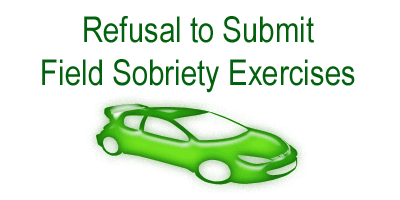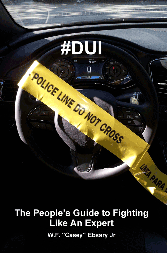- HOME
- Contact Us
- Beat Your D.U.I.
- 10 Day D.U.I. Rule
- Court Procedures
- D.U.I. Cop Contest
- D.U.I. Consequences
- D.U.I. DWI Traffic Stop
- FAQs Before D.U.I. Arrest
- FAQs After D.U.I. Arrest
- Do what after a D.U.I. Arrest?
- I'm in Jail, Where's My Car?
- Why wasn't I released?
- Do I Have to Take a Drug Test?
- Can I be Forced to Take Blood Test?
- Can I Get My Own Blood Test?
- Can I Get My License?
- DHSMV Most Important Forms
- When Do Arrestees Get Out Of Jail?
- Should I just plead guilty?
- Medical Records Used Against Me?
- Charged with D.U.I. while asleep?
- Find The Best Lawyer
- Free Forms and Books
- Guide To Fighting D.U.I.s
- Hardship License
- Laws, Drugs, & Driving
- Tampa D.U.I.s
- Search
- Retain Your License
- Choose The Best Lawyer
- Reviews
Refusal to Submit to Field Sobriety Exercises

When Can a Refusal to Submit to Field Sobriety Exercises be held Against a Driver?
"Generally, a Defendant's refusal to perform a specific activity requested by law enforcement that he or she is not required to perform is not relevant and therefore inadmissible at trial. An exception to the general rule is if the Defendant is told or advised of some adverse consequence of the refusal to perform the activity and still refuses to perform the activity. The Defendant's refusal thereafter can be seen as probative of consciousness of guilt and therefore admissible."
What can a DUI Lawyer do to prevent a judge or jury from considering a refusal to perform tests?
A Motion to Suppress Refusal to Perform the Field Sobriety Exercises can be filed based on relevancy and the failure to inform the driver of the adverse consequences of a refusal.
What have Florida Courts ruled where a Refusal to Perform the Field Sobriety Exercises is an issue?
"In the context of a refusal to perform Field Sobriety Exercises, the Florida Supreme Court addressed the issue in State v. Taylor, 648 So.2d 701 (Fla. 1995) [20 Fla. L. Weekly S6b]. The Supreme Court found that a refusal to perform Field Sobriety Exercises can be admissible to show consciousness of guilt. Id. at 705. In that case, the Court specifically found that the Defendant was asked twice to take the tests, he was explained the purpose of the tests and additionally warned that the officer would be forced to make a decision concerning arrest based on his observations up to that point. Id. at 704. The Court rejected Taylor's claim of a “safe harbor” as result of being clearly advised of the adverse consequences of his refusal. Id."
What has the Florida Supreme Court ruled about the admissibility of Refusal to Perform tests?
"The Florida Supreme Court again addressed the issue of a Defendant's refusal to perform some act and consciousness of guilt in Menna v. State, 846 So.2d 502 (Fla. 2003) [28 Fla. L. Weekly S340a]. In Menna, a Defendant was asked to submit to a gunpower residue test and declined to submit to the test without first talking to her attorney. Neither person who asked the defendant to submit to the test indicated that it was anything but voluntary and did not advise her of any adverse consequences of her refusal to submit to the test. The Court in upholding the exclusion of the refusal in Menna adopted the reasoning of Judge Pearson in Herring v. State, 501 So.2d 19 (Fla. 3rd DCA 1986) which stated “a Defendant's behavior is circumstantial evidence probative of his consciousness of guilt, and ultimately guilt itself, only when it can be said that the behavior is susceptible of no prima facie explanation except consciousness of guilt.”Menna, 846 so.2d at 505 (citations omitted).
How does a trial court decide on an alleged Refusal to Submit to Field Sobriety Exercises?
Recently, a trial court decided that a refusal to submit to field sobriety testing was not to be used by a DUI prosecutor, the jury, or in the court. The court ruled:
"In the Instant case, Officer Martin clearly indicated that the exercises were voluntary and solely up to the Defendant as to whether she wanted to perform them. His responses to her questions about what happens if she does not perform them are clearly ambiguous at best and at worst confusing to the Defendant because the officer never indicates what decision (to arrest the Defendant) he is talking about. Thus any adverse consequences stemming from the refusal are never clearly relayed to the Defendant unlike the Defendant in Taylor who is clearly advised that the decision to refuse the tests will be used by the Officer in deciding whether to arrest the Defendant."
How does a refusal to submit to Field Sobriety Exercises prove the guilt of the Driver in a DUI case?
Prosecutors call the refusal proof of consciousness of guilt. However a trial court has ruled: "Compounding the problem of the issue of consciousness of guilt in this case is the Defendant's statements that she does not want to perform the exercises because of her bad knee. Her initial decision not to perform the exercises is clearly based on her physical limitations. Under Menna, because the Defendant's behavior is susceptible of another prima facie explanation besides consciousness of guilt, the behavior is not circumstantial evidence probative of consciousness of guilt. Whatever consciousness of guilt could be gleaned by her reluctance to perform the exercises is clearly overshadowed by the fact that she agrees to perform the exercises when it is made clear that being arrested is the adverse consequence of her refusing to perform the exercises. This Court, based upon the facts of this case, finds the Defendant's refusal to perform the Field Sobriety Exercises is not circumstantial evidence of guilt, not probative to the issue of guilt itself and therefore not admissible."
Source: 23 Fla. L. Weekly Supp. 791a
Online Reference: FLWSUPP 2307TATT
Case Number: Case No. 59-2014-MM-7630-A County Court, 18th Judicial Circuit in and for Seminole County

